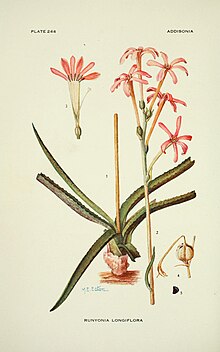Agave longiflora
| Agave longiflora | |
|---|---|

| |
| Scientific classification | |
| Kingdom: | Plantae |
| Clade: | Tracheophytes |
| Clade: | Angiosperms |
| Clade: | Monocots |
| Order: | Asparagales |
| Family: | Asparagaceae |
| Subfamily: | Agavoideae |
| Genus: | Agave |
| Species: | A. longiflora |
| Binomial name | |
| Agave longiflora | |
| Synonyms[2] | |
|
Manfreda longiflora (Rose)Verh.-Will. | |
Agave longiflora (synonym Manfreda longiflora) is a species of flowering plant in the family Asparagaceae that is native to the Lower Rio Grande Valley of Texas in the United States and northern Tamaulipas in Mexico.[1] Common names include amole de río, longflower tuberose, and Runyon's huaco.[3] The type specimens were sent by botanist and photographer Robert Runyon (1881–1968) to the New York Botanical Garden in 1921. Consequently, the species was initially placed in a monotypic genus named in his honour, Runyonia, by Joseph Nelson Rose.[4] The species has been placed in the genus Manfreda, now absorbed into Agave. A. longiflora is a rhizomatous perennial with 3–7 prostrate leaves in a basal rosette.[5] It inhabits hills, terraces and slopes in the semi-arid Tamaulipan mezquital.[6]
References
- ^ a b "Manfreda longiflora - (Rose) Verhoek-Williams St. Joseph's Staff". NatureServe Explorer. NatureServe. Retrieved 2011-12-09.[permanent dead link]
- ^ a b "Agave longiflora". World Checklist of Selected Plant Families. Royal Botanic Gardens, Kew. Retrieved 2019-04-13.
- ^ "Manfreda longiflora". Integrated Taxonomic Information System. Retrieved 2011-12-09.
- ^ "Runyonia longiflora". Addisonia. 7. New York Botanical Garden: 39–40. 1922. Archived from the original on 2012-04-26. Retrieved 2011-12-09.
- ^ Poole, Jackie M.; William R. Carr; Dana M. Price; Jason R. Singhurst (2007). Rare Plants of Texas: a Field Guide. Texas A&M University Press. pp. 304–305. ISBN 978-1-58544-557-8.
- ^ "Manfreda longiflora". CPC National Collection Plant Profile. Center for Plant Conservation. 2010-09-28. Archived from the original on 2011-10-26. Retrieved 2011-12-09.

